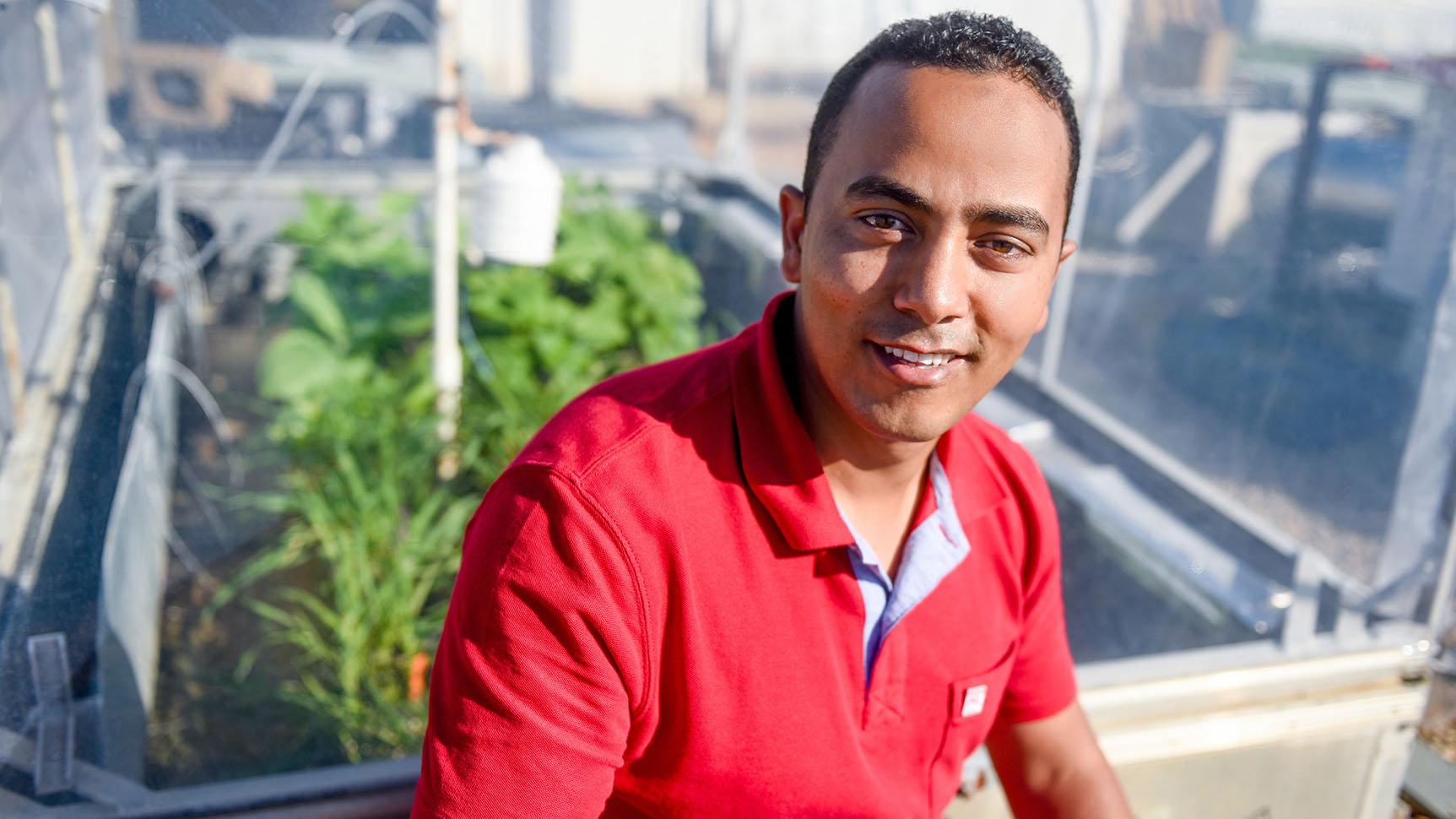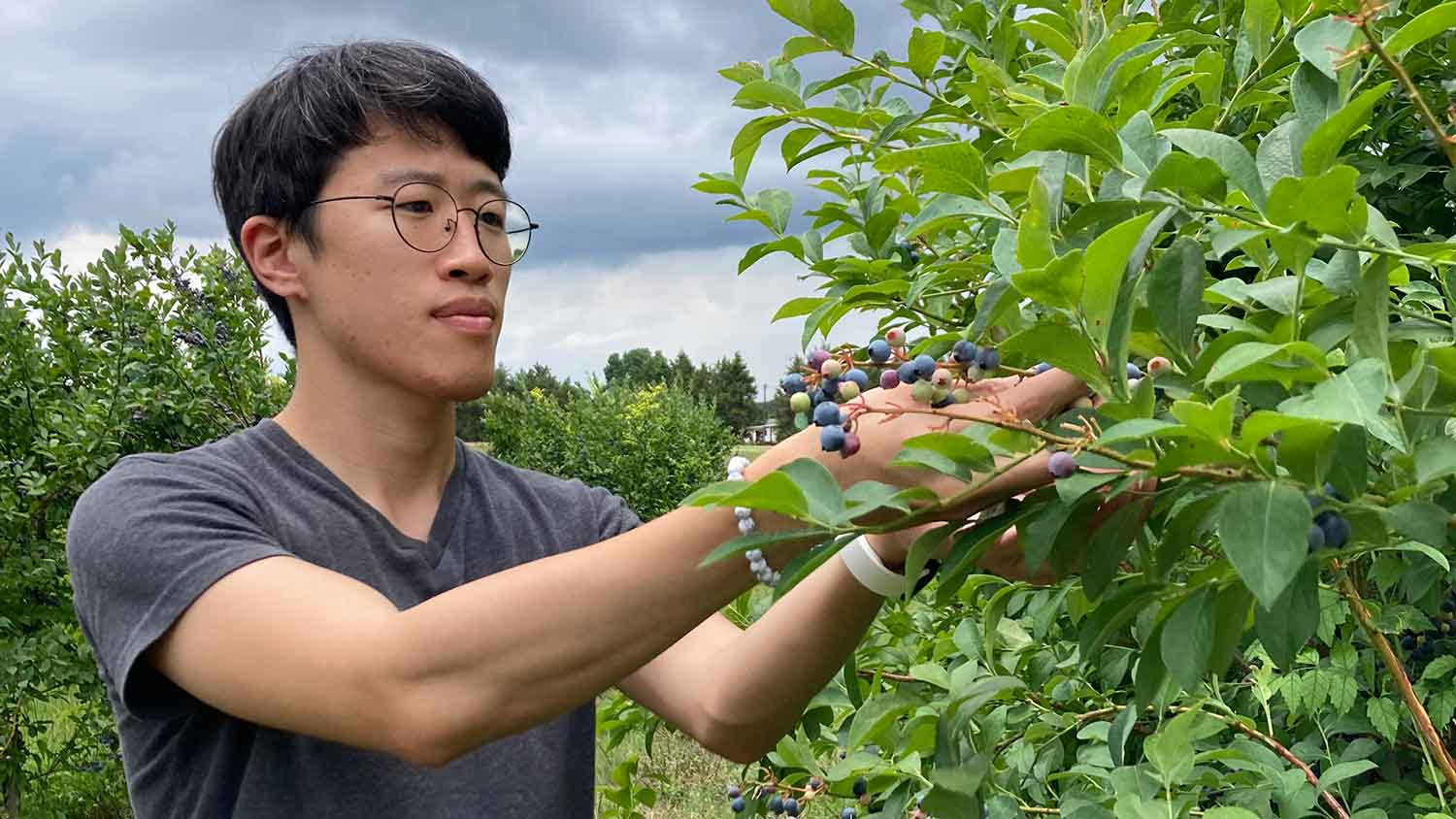Sayed Mashaheet

With a goal of feeding the planet, Sayed Mashaheet asks a singular question: does ozone stress make plants sick?
Here is how: The NC State University PhD alumnus and postdoc is working to develop resilient wheat varieties that are more tolerant to ozone—a pollutant often associated with climate change—and more resistant to wheat rust, a devastating disease that looks like rust on wheat stalks.
In 1998, researchers discovered a new strain of wheat rust in Uganda. It was confirmed in 1999 and named Ug99. This new strain of the disease can destroy a wheat crop, leaving farmers and their families without food or income after working hard for an entire growing season, even if the disease reaches the field only a few weeks before harvest.
“At the time it was detected, this wheat rust strain was capable of overcoming most of the wheat varieties worldwide. It was a big problem that continued to spread and evolve,” Mashaheet said. Today, many variants of this wheat rust strain are found in countries across Africa and the Middle East.
Around the globe, scientists are in a race against the disease, working to develop wheat varieties that are resistant to rust. The rapid pathogen evolution, the airborne spores, the difficulties of fungicide application and the lack of resistant varieties makes it hard to prevent the disease or stop its advance.
Mashaheet’s work specifically focuses on identifying lines of wheat that are tolerant to ozone, a toxic gas that can weaken wheat, making it more susceptible to diseases like wheat rust. “If wheat rust reaches Asia, with a large portion of the world’s population, and significantly high ozone pollution, famine is a real possibility,” Mashaheet said.
When Mashaheet got his scholarship from his home country of Egypt in 2012 to begin his doctoral program at NC State, the new strains of wheat rust weren’t there yet. But in 2015, Ug99 was discovered in Egypt’s wheat crop.
Mashaheet came to NC State to work with Fitzgerald Booker with the U.S. Department of Agriculture’s Agricultural Research Services, but Booker died of cancer before they could meet. Two other NC State faculty members—David Marshall, NC State plant pathology professor and USDA-ARS researcher, and Kent Burkey, NC State crop science professor and USDA-ARS crop physiologist—stepped in as Mashaheet’s advisors.
Marshall’s group has been on the front lines of the race against wheat rust, searching for resistant varieties, and Burkey has decades of globally recognized experience in ozone sensitivity research.
Mashaheet’s research confirmed that plants stressed by ozone exposure were more likely to be infected by rust. He compared plants under ozone stress with plants in clean air, and found that ozone exposure caused plants to be less resistant to rust. “It gives an advantage to the pathogen (rust) because the plant is weakened by ozone stress,” he said.
Marshall’s work involves seeking genes for rust-resistance in wheat. Researchers around the globe believe that plants must have a set of multiple genes for rust resistance in order to defend against the disease. Mashaheet’s research begins with wheat varieties identified as rust-resistant; he is testing these varieties to determine which are also ozone tolerant.
While researchers focus on finding plants that are robust and healthy, growers desire wheat that is high yielding. By crossing rust-resistant, ozone-tolerate plants with a high-yielding plant, he hopes to develop a line of wheat that will meet growers’ needs.
Maintaining and expanding wheat yields also is important for world food security. By 2050, food production must increase by 70 percent, in order to feed a projected world population of 9 billion people. Wheat and other cereal crops are expected to play a major role in feeding the world.
And unfortunately, higher ozone levels tend to be more of a problem in parts of the world with higher populations and higher food insecurity, areas like China, India and the Mediterranean region, Mashaheet said, adding, “Ozone hits where it hurts.”
During his postdoc research, Mashaheet has discovered 10 genes that produce plants with ozone tolerance. “The leaves on these plants look very healthy—it’s easy to tell the genes are working,” he said.
In addition, he has collaborated with NC State food safety researchers to determine if ozone stress can cause plants to carry more pathogens that can make humans sick.
In the spring, Mashaheet was seeking a new opportunity in plant pathology research. He ultimately plans to return to his home country of Egypt, where he is a faculty member engaged in teaching and research at Damanhour University.
While he was a doctoral student at NC State, he participated in the Graduate School’s Certificate of Achievement in Teaching program to help hone his teaching skills. As guest speaker at the Graduate School’s spring Celebration of Graduate Student Success in April, he told honorees that the program “helped an Egyptian introvert to serve as a teaching assistant in two courses in my second language.”
Though his teaching experience is with college students, he branched out to a tougher audience while at NC State—teaching preschoolers about his work. He and his wife Camellia have three children—two daughters and an infant son.
Mashaheet wanted to share his wheat research with students in his daughter’s preschool class. He helped them to grow wheat at school and showed them how weak strains of the disease look on their plants, comparing it to video from Africa of what the devastating rust strains can do to wheat.
His reward was a thank-you booklet of photos and quotes made by the students who expressed their thanks for all they learned. “This was more important to me than anything,” he said.
“It has been a nice journey,” he said of his years at NC State. “I really enjoyed it, and I hope it will lead me to a new stage.”
Read more from the Graduate School’s Think Magazine.
Learn more about graduate programs in plant pathology.
Download this article as a PDF.
- Categories:


